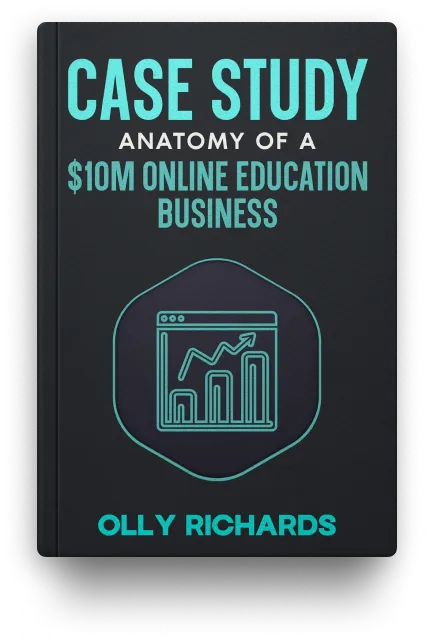In the last few years, I’ve launched 5 separate high-ticket programmes.
Now, please guess how many sales calls I’ve done.
(In total.)
Before I reveal the answer, here’s a quick summary of everything I’ve launched:
At StoryLearning:
- Teaching certification (I wrote about this in my case study)
- VIP language coaching (not in my case study but should be)
At OllyRichards.co:
- 1-to-1 mentorship
- In-person mastermind
- My (brand new) scaling programme
Prices range from $1,500 to $80,000 and represent multiple millions of dollars in sales.
And how many sales calls have I done?
.
.
.
(Most likely you guessed the answer from the subject line.)
Zero.
Nada.
Not one.
(The only exception to this is that we introduced sales calls last year for the StoryLearning coaching programme, but obvs I don’t do them myself.)
For everything else, 100% of spots were sold without me (or anyone else) so much as looking at a Zoom screen.
Why did I do it this way?
Simple:
Because I choose to.
I don’t like sales calls.
And so I choose not to do them.
It’s my personal red line.
Don’t get me wrong, I’m not against having sales calls in the business. I just don’t want to do them.
Here’s how I sell my high-ticket programmes instead:
Over text message.
Usually in the following setting:
Mid-closing a high-ticket sale
”But, wait!”, you cry.
”Surely you need sales calls to shift something costing, $2k, $5k, $12k or even $80k?”
Hah!
Quite the opposite is true.
See, when people teach “high-ticket sales”, they’re usually talking about closing cold leads.
e.g. People who have just found you on a Facebook ad, and 5-minutes later you’re trying to sell them a $10k programme.
Plenty of direct response businesses operate in this way.
And it takes significant skill, a healthy degree of pressure, and willingness to play a numbers game.
None of which I’m willing to do.
But luckily, I don’t need to.
And neither do you.
You see, if your education business is anything like mine, you produce content.
You send emails.
You appear on podcasts.
You build a relationship with your audience.
(This is the bread and butter of an education business.)
Now, what does all this content give you?
Trust.
Generally, by the time someone applies to work with me in some way, they’ve already:
- read my case study
- watched my videos
- consumed a bunch of emails
- taken a couple of my workshops
- heard me on a podcast
They trust me.
They’ve seen so much social proof they think I’m the second coming of sliced bread.
All of which means…
They don’t need no sales calls.
They already know they want to go ahead. They just need to confirm a few details, like format, deliverables, dates and, of course, price.
But understand:
None of this requires any persuasion or manipulation.
That’s what makes it such a good way to sell.
So, when I talk to entrepreneurs about high-ticket and I see the words “sales calls” strike fear into their eyes, I simply tell them they don’t need to do them.
[everyone breathe a collective sigh of relief]
(Oh, and in case you’re wondering, I convert approximately 66% of my “sales” conversations over text. So there ain’t nothing broken, either.)
Namaste,
Olly

